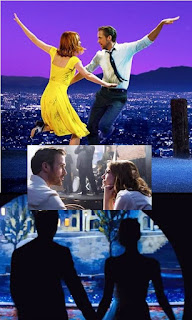Part of the answer lies in relating the tradition to the audience's experience. Seb draws Emma Stone's "Mia" into understanding what he loves about jazz by relating it to the dramas that she loves, likening it to friends engaged in lively conversation. The director draws his millennial audience into the idea that the world can be musical by panning through an L.A. traffic jam, driver after driver jamming to his or her own soundtrack from car music systems. It's not much of a stretch when frustrated drivers emerge from their cars to merge in a song-and-dance number that animates the interstate as far as the camera can see. Other dances and songs start from characters' movements and dialogue; after a dance duet ends, Gosling naturally does a little soft-shoe as he walks away alone.
Those of a certain age will recognize the sound-stage setting from Singing in the Rain, the dance duet in a darkened park from The Band Wagon, and an art-inspired dreamscape from An American in Paris. The story, in fact, is boiler-plate, familiar from iterations of A Star is Born and the recent Last Five Years: "Mia" dreams of acting; "Sebastian," dreams of playing piano in a jazz club of his own; they support each other until the divergence of their two careers threatens the relationship. (See my reflection on The Last Five Years.)
But Chazelle puts a contemporary spin on those traditions. It's not just the cell phones, the fashions, and the occasional four-letter word; it's also playing with time, wrapping different strands of the story around a single incident, so that we come at it from different perspectives (another element shared with The Last Five Years). Composer Justin Hurwitz, with lyricists Benj Pasek and Justin Paul, aims at a sweet spot between the kind of "specific" songs that fit the moment and the more generalized imagery of pop songs - focused on dreams,stars, and how everyone is looking for love*.
The exceptional song, Hurwitz's favorite, is "Audition," a hint of what could have lifted this movie from pleasant homage to be a stronger, more "revolutionary" updating of the tradition. Hurwitz cites Emma Stone's live - in - studio performance for why he loves it, as the song is specific to the character and the situation in the way he consciously avoided elsewhere (see his interview with Lambe). "Mia's" future career is on the line when she is asked to simply "tell us a story." Unsure what to say, she lights up when she begins to sing her aunt's story of an impulsive leap into the Seine in winter, and she grows in confidence as she adds to the story.
Chazelle missed an opportunity to create a musical scene even stronger than "Audition" when Seb, flying in from out of town, surprises Mia with dinner by candlelight. It starts as a romantic, happy occasion, but dissolves into rancor over Mia's complaint that Seb is away so much, and his protest (totally justified, I think) that he has been away providing for her. This scene is the dramatic heart of the movie, and, if Chazelle, Hurwitz et. al. had reached beyond the MGM tradition to what has developed on Broadway in Sondheim and in The Last Five Years, this, too, could have been a musical number to integrate the musical style with the dramatic story.
Still, it's clear that the creators of this movie and their stars love what they're doing, They have fun. There's no other excuse to build a song-and-dance number for Mia and her roommates' preparations to party. No one could expect Gosling and Stone to measure up to Astaire or Charisse in their dancing, but they move with spirit, precision, and apparent ease, while the camera does most of the dancing for them - swirling around from above, or taking the dancers in silhouette across a starry sky. The dramatic scenes are as real as they can be, even when Stone plays her character playing another character for an audition: it's a remarkable demonstration of the actor's craft.
Besides, the two characters are so appealing that we want their romance to succeed. For the same reason, we want the movie to succeed.
And so it does.
*(Stephen Sondheim, meticulous tailor of songs to situations, explains how rock 'n' roll's displacement of show tunes from the top 40 freed Broadway composers of the pressure to write "hits". See my article about his conversation with pianist Marian MacPartland.)























